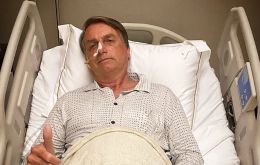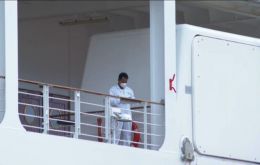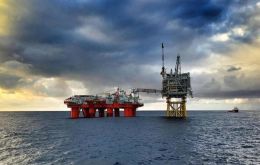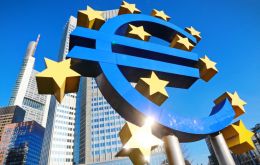MercoPress. South Atlantic News Agency
Stories for January 3rd 2022
-
Monday, January 3rd 2022 - 22:52 UTC
Bolsonaro hospitalized – emergency surgery not ruled out yet

Brazil's President Jair Bolsonaro was rushed to a hospital in the early hours of Monday with severe abdominal pain, which appeared to be a relapse in his intestine condition stemming from a 2018 stab wound while campaigning for the presidency. It has not been ruled out new surgery might be required.
-
Monday, January 3rd 2022 - 21:57 UTC
Peru's inflation the highest in 13 years

Peru's inflation for 2021 has reached 6.43%, thus becoming the highest in the last 13 years and twice as high as the Government's target range, set at 3%. It was also over three times over 2020's annual record of 1.97%.
-
Monday, January 3rd 2022 - 21:53 UTC
Kenyan paleoanthropologist Richard Leakey dies at age 77

Paleoanthropologist Richard Leakey, whose surname is tantamount to the origins of mankind, has died Sunday at his native Nairobi, it was announced. He was 77.
-
Monday, January 3rd 2022 - 09:56 UTC
Strong recovery of employment in most of Chile

Unemployment in Chile is down to 7,5%, the lowest since January 2020, according to the country's stats office INAE. The 7,5% figure is the seventh consecutive mobile quarter, (September-November), which has seen a systematic reduction in unemployment plus a simultaneous standing recovery of lost jobs, some 74,6% of the two million wiped out by the coronavirus pandemic.
-
Monday, January 3rd 2022 - 09:50 UTC
Belgian station in Antarctica hit by COVID-19 infections

Although Project Manager Joseph Cheek said the situation was “not dramatic,” at least 16 of the 25 workers at Belgium's Princess Elisabeth polar station have tested positive for COVID-19 and the whole staff will remain isolated until Jan. 12, it was reported.
-
Monday, January 3rd 2022 - 09:31 UTC
Brazil's Sanitary regulator strongly recommends suspending the cruise season: Covid-19 in several vessels

Brazil's National Sanitary Surveillance Agency, ANVISA has advised the suspension of the cruise season because of several covid-19 outbreaks onboard pleasure vessels sailing along the Brazilian coast.
-
Monday, January 3rd 2022 - 09:27 UTC
Mar del Plata fears offshore oil wells may end up damaging the city's economy

Argentina's government has issued an environmental impact declaration for offshore oil drilling off the coast of Mar del Plata which has prompted voiceful objections from local residents, particularly Mayor Guillermo Montenegro of the opposition Juntos por el Cambio (JxC), while Federal Energy Secretary Darío Martínez welcomed the decision.
-
Monday, January 3rd 2022 - 09:24 UTC
Bolivian VP bows to pressure, agrees to take a COVID-19 vaccine

Bolivia's Vice President David Choquehuanca finally agreed to get vaccinated against COVID-19 despite ratifying that taking the jab in voluntary in Bolivia and that he has already overcome the disease.
-
Monday, January 3rd 2022 - 09:20 UTC
The Euro at 20

By Jean Pisani-Ferry (*) – Twenty years ago, on January 1, 2002, citizens of 12 European countries began using new euro banknotes and coins. A larger-than-life project – emblematic of a time when European leaders were bold enough to step into the unknown – thus became a tangible reality.
-
Monday, January 3rd 2022 - 09:19 UTC
China cuts subsidies to the manufacture of electric vehicles

China has announced it will cut subsidies for green energy vehicles such as electric cars by 30%, beginning January this year. A release from the Ministry of Finance said that the subsidies policy, NEV 2022 will be definitively closed by 31 December 2022.
